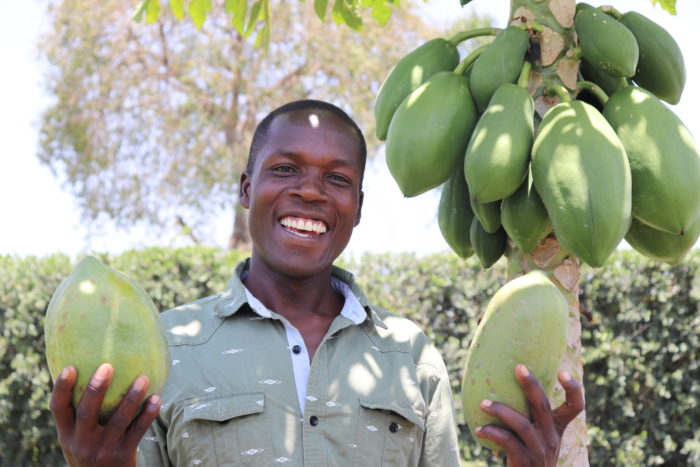Farmers living adjacent to the Serengeti-Mara ecosystem peacefully coexisting with wildlife
Date
September 18, 2019
Mwita Igayi at his pawpaw farm which is adjacent to the Serengeti National Park, Tarime district, Tanzania. Photo Joy Kivata
However, their crops were getting destroyed by the wild animals especially elephants; incurring massive losses and no income. Human-wildlife conflict is a common challenge for communities living adjacent to the Serengeti-Mara ecosystem. This challenge is further compounded by impacts of climate change that have seen farmers such as Mwita not be able to optimize harvests from their farms.
Through the SEMA project in Kenya and Tanzania that targets farmers and communities living within the Serengeti-Mara ecosystem, Mwita got training on how to peacefully coexist with the wild animals, conserve the environment, plant trees, take up climate-smart sustainable agriculture and land management techniques, and use of improved seeds. To contribute to solving the human-wildlife conflict, he was trained on human-wildlife conflict management and compensation/consolation mechanism.
From the training, he was advised on crops that do not attract wild animals. It is from this that he explored the technics taught and started his pawpaw farm in 2018 and in august 2019 he harvested his first produce. He was excited to harvest 100 pawpaws per week, which he would in return sell for 1000tsh. The harvest is now not only enough for the family, but they also have surplus for selling .. This has helped them to improve their economy and seen them build their new home. He now plans to buy a hybrid cow. Consequently, he is now able to comfortably buy school uniform and books for his first-born child. He hopes to expand his farm by 2020 to have over 1000 pawpaws through which he can grow his business. He has so far planted over 100 agroforestry trees in his farm in an effort to adapt to effects of climate variability.
The Serengeti-Mara ecosystem has been facing many challenges with pressing natural resource management and biodiversity conservation challenges threatening the ecosystem; these include socio-economic, environmental, climate change impacts as well as inadequate policy, legal and institutional responses. The SEMA project aims to contribute to the conservation of Serengeti-Mara transboundary ecosystems through empowering local communities to adopt sustainable livelihoods and enhancing regional cooperation.
The SEMA project is funded by the European Union read more here on the SEMA project